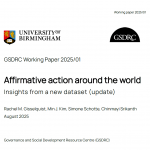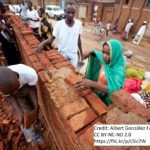Rachel M. Gisselquist, Min J. Kim, Simone Schotte, and Chinmayi Srikanth Abstract: Affirmative action (or ‘positive action’) measures have been adopted in dozens of countries around the world as a means of addressing group-based inequalities in educational enrolment, employment, political representation, and other areas. Although there is a large research literature on ...» more
Inequalities & exclusion
Increasing Birth Registration for Children of Marginalised Groups in Pakistan
This review looks at approaches to promote birth registration among marginalised groups, in order to inform programming in Pakistan. It draws on a mixture of academic and grey literature, in particular reports by international development organizations. While there is extensive literature on rates of birth registration and the barriers to this, and consensus on approaches to ...» more
Role of Faith and Belief in Environmental Engagement and Action in MENA Region
Almost all religions reflect on the creation of the universe, or universes, in different forms and with varying degrees of clarity or detail. Common across most religions is an agreement that “creation” is an act of God and should be treated as such. This rapid literature review collates evidence on the role of faith and belief in environmental engagement and action in MENA ...» more
LGBT rights and inclusion in Small Island Developing States (SIDS)
This review looks at the extent to which LGBT rights are provided for under law in a range of SIDS, and the record on implementation/enforcement, as well as approaches to promote LGBT rights and inclusion. SIDS covered are those in the Caribbean, Pacific, and Atlantic-Indian Ocean-South China Sea (AIS) regions. The review draws on a mixture of grey literature (largely from ...» more
Promotion of Freedom of Religion or Belief
Freedom of religion or belief (FoRB) is a fundamental human right. However, the general global the trend in recent years is towards increased FoRB violations by both government and non-government actors. Notable exceptions are Sudan and Uzbekistan, which have shown significant improvement in promoting FoRB, while smaller-scale positive developments have been seen in a number ...» more
Trends in Conflict and Stability in the Indo-Pacific
This report looks at trends in conflict and instability in the Indo-Pacific region, focusing on climate change effects and a number of civil liberties. The Indo-Pacific region is both highly vulnerable to the effects of climate change and already facing significant security risks and challenges, many of which will be exacerbated by the impact of climate change. There are ...» more
Prevalence of health impacts related to exposure to poor air quality among children in Low and Lower Middle-Income Countries
This rapid review provides an assessment of the contemporary health impacts arising from the household (indoor) and ambient (outdoor) air pollution exposure in low income (LIC) and lower-middle-income countries (LMICs), with a specific focus upon children aged under 5 years. The review synthesises findings of key systematic reviews, as well as international and national ...» more
Impact of COVID-19 on Child Labour in South Asia
The COVID-19 pandemic has not (to date) hit South Asia as badly in terms of infections and deaths as some other parts of the world (notably Europe). However, it is having a profound negative economic impact on the region. Experience of previous epidemics/financial crises suggests that the current crisis will lead to a rise in child labour across the developing world, including ...» more
Workplace-based Learning and Youth Employment in Africa
Workplace-based learning is a supply-side approach to youth employment that includes practical or on-the-job training that is usually provided through an apprenticeship, internship, learnership , work placement or other practical training component of a vocational education or training programme. For the workplace-based learning approach to be effective, it requires ...» more
Social protection
Social protection is commonly understood as ‘all public and private initiatives that provide income or consumption transfers to the poor, protect the vulnerable against livelihood risks and enhance the social status and rights of the marginalised; with the overall objective of reducing the economic and social vulnerability of poor, vulnerable and marginalised groups’ (Devereux ...» more
Interventions to Reduce Forced Marriage
This review drew largely on academic papers as well as reports by international development organisations. Evidence and hence lessons on how to combat forced marriage are limited and sometimes contradictory. Overall, the literature points to a number of approaches that can be effective, notably: empowerment of girls; community approaches to change social norms and attitudes on ...» more
Challenges Religious Minorities Face in Accessing Humanitarian Assistance
This rapid literature review, surveys evidence regarding the challenges specific religious minorities face in accessing humanitarian assistance. This review acknowledges that there remains a paucity of research on the presence, scale and diversity of religious groups, experiences, values, motivations and engagements in a range of humanitarian contexts and how these intersect to ...» more
Benefits of STEM Education
The literature concurs with the general view that science, technology, engineering and mathematics (STEM) education is necessary to facilitate economic development, international competitiveness and job creation. However, the literature does not specify the particular benefits of STEM education in developing countries since the consensus is that STEM education is generally ...» more
A Mapping of Larger Youth Employment Programmes in Developing Countries
There is a robust literature on youth employment that spans academic and grey literature. This rapid literature review combines academic and grey literature to identify larger youth employment programmes in developing countries. The review identifies the countries, which have a national youth policy. There is no literature that assesses the sustainability of national youth ...» more
Legislation and Policy Addressing Inequality and Redistribution in Rwanda
This report is one of three related K4D helpdesk reports on inequality in Rwanda. The other two examine links between poverty, inequality and exclusion (Carter 2018) and provide data on inequalities (Orrnert 2018). This review summarises key national policies and legislation related to inequality and redistribution in Rwanda. Where available, this review provides insights ...» more
Impact of Education Interventions for Working Children
Recent global estimates indicate that 152 million children – 64 million girls and 88 million boys – are engaged in child labour across the world (ILO 2017b: 8). According to these same estimates, 71% of child labourers work in the agricultural sector and 69% in unpaid work within their own family. Nearly half of all those in child labour are doing ‘hazardous work’ (ibid). ...» more
Links Between Education and Child Labour
According to recent estimates, approximately 152 million children were engaged in child labour globally in 2016 (ILO 2017a: 5). There are many forms of children's work, involving different levels of demand and danger. The International Labour Organisation (ILO) defines child labour as work that is detrimental to children, by depriving them of their childhood, their potential ...» more
Maternal, Newborn and Child Health in Emergency Settings
More than 500 women and girls die in emergency settings every day due to complications arising from pregnancy and childbirth (UNFPA, 2018, p. 3). In 2017, an estimated 535 million children (nearly one in four of the world’s children) lived in countries affected by emergencies (UNICEF, 2017). This report provides examples of organisations working in maternal, newborn and ...» more
Situation of Persons with Disabilities in Lebanon
An estimated 10-15% of the Lebanese population has physical, sensory, intellectual, or mental disabilities, according to the more reliable data available. The rate of prevalence is estimated at about 10% among refugees who have fled from Palestine to Lebanon from 1947, at about 8% among Palestinian refugees from Syria, and at 10-22.8% among refugees who have fled Syria since ...» more
Effects of Violence in the Home on Children’s Mental Health and Psychosocial Wellbeing During Conflict
Being exposed to violence in the home during war increases children’s risk of developing problems in mental health and psychosocial wellbeing (MHPSW), a small but robust evidence base shows. Conversely, this evidence shows that supportive parenting can be a protective factor against the demonstrated negative effects of war on children’s MHPSW. Evidence from multiple sources ...» more




